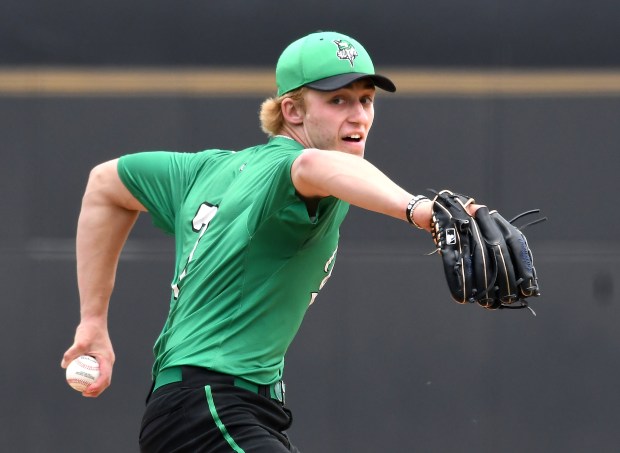Next month’s election in the 40th Senate district is a rematch between Democratic incumbent Patrick Joyce and Republican challenger Philip Nagel, whom Joyce defeated two years ago,
Joyce, of Essex, took office Nov. 8, 2019, appointed to the seat to replace Sen. Toi Hutchinson, whom Gov. JB Pritzker picked to oversee the rollout of Illinois’ foray into legalized production and sales of recreational marijuana.
Joyce won a full term in 2020, capturing 58.5% of the vote while Republican challenger Eric Wallace garnered 41.5%.
Joyce was reelected in November 2022, defeating Nagel, of Braidwood, with 59% of the vote to Nagel’s 41%.
In this year’s March primary Joyce defeated Democratic challenger Kimberly Earling, of Braidwood, garnering 79% of the vote to 21% for Earling.
Nagel was unopposed in the Republican primary.
The district includes portions of Cook, Grundy, Kankakee and Will counties.
The 40th includes all or portions of communities in the Southland including Chicago Heights, Crete, Flossmoor, Frankfort, Matteson, Mokena, New Lenox, Olympia Fields, Park Forest, Richton Park, South Chicago Heights, Steger and University Park.
Kankakee County accounts for about 40% of the 40th’s population, while 25% is in Will County; the remainder is in south Cook County and a small portion of Grundy County.
Joyce said property taxes remain a pressing issue and he advocates for increased state spending on public education in order to lessen the tax burden on property owners.
Joyce noted he was a sponsor of the Southland Reactivation Act, which targets commercial and industrial properties that have shown a clear pattern of economic decline. The program makes it easier for communities to return derelict properties to the tax rolls.
With large portions of the 40th encompassing agricultural uses, Joyce, a fourth-generation farmer, received the “Friend of Agriculture Award” in September from the Illinois Farm Bureau.
Nagel served in the Air Force after high school and said in order to reduce the property tax burden, Illinois needs to do more to bring companies to the state. He said he supports tax breaks for businesses as an incentive for them to open in Illinois.
Nagel also said the Illinois budget needs to be slimmed down, and blamed Democrats who control the General Assembly.
“Their tax-and-spend policies have resulted in bloated state budgets and made Illinois the least tax-friendly state in the nation. This trajectory is unsustainable and calls for a change in leadership,” he said.
Addressing unfunded pension obligations for unionized state workers is part of reducing state spending, and Nagel said he’d like state pensions to shift to a 401K model.
If elected, Nagel said he would work to reign in state spending and reduce the size of government.
Joyce’s political lineage includes his father, Jerry, who served 17 years in the state Senate and retired in 1992. Jerry Joyce’s wife, Janet Joyce, served out the remainder of her husband’s term until January 1993. Jerry Joyce died in June 2019 at age 80.
At the end of the April-June quarter, Joyce’s campaign had nearly $500,000 on hand, and had taken in contributions during the 2nd quarter of more than $98,000.
Since then, campaign finance filings show a massive surge of contributions, largely from organized labor, the state’s Democratic party and other sources.
For example, the Illinois Federation of Teachers put $30,000 into Joyce’s campaign Sept. 16, and the United Association of Journeymen and Illinois Pipe Trades contributed $68,500 on Sept. 20, campaign filings by Joyce show.
The North Central Illinois Laborers’ District Council contributed $50,000 on Aug. 27, according to filings.
Including in-kind contributions to pay for things such as campaign work and photography for Joyce’s campaign, his party transferred $150,000 into the reelection effort on Sept. 27, according to filings.
That is on top of more than $180,000 in other contributions made to Joyce’s campaign since the tally for the April-June, filings show.
Nagel’s campaign finance reports show large contributions from state Republicans.
The Senate Republican Victory Fund has made several thousands of dollars in in-kind and cash contributions. The state Republican organization has also made in-kind contributions of more than $100,000 for printing and mailing of campaign materials, Nagel’s filings show.
The Victory Fund put a bit more than $70,000 into Nagel’s campaign in a Sept. 23 transaction, and that had followed infusions of more than $132,000 on Sept. 16, the same amount on Sept. 9 and the like amount Sept. 3, filings show.
For the April-June filing period, Nagel’s campaign recorded receipts of a little more than $21,000, and the campaign had a bit more than $18,000 on hand at the end of the quarter, filings show.



